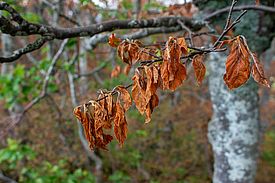28.03.2023 | Lea Huber | News WSL
Due to climate change, many deciduous trees leaf-out earlier. However, the risk of late spring frosts remains high and the frequency of extreme droughts is clearly increasing. Tree species able to quickly recover after frost damage may be advantaged in the future, shows a study by the Swiss Federal Institute for Forest, Snow and Landscape Research WSL.
Spring frosts have always been a risk for deciduous trees. Especially when new leaves are emerging as this is the most sensitive stage to frost. But: "Although there is a lot of talk about frost damage, it is unclear how much it affects our trees," says Frederik Baumgarten, a former PhD student at WSL. It is also unclear why some trees leaf-out early despite the risk of frost, and how climate change might influence that in the future. That's what he and his fellow researchers wanted to find out.
For this purpose, Baumgarten carried out an outdoor experiment. He used potted two-year-old trees of four native species: wild cherry, pedunculate oak, hornbeam and European beech. At weekly intervals, he placed them in a heat chamber for a few days to simulate a warm period and make them flushing at different time – a little earlier or a little later than control trees that were left in natural conditions. Shortly after leaf emergence, he induced an artificial frost event in a cold chamber with two different intensities, which caused the death of the leaves. Then he transplanted all trees outside and monitored their recovery.
No risk, no fun ¶

Frederik Baumgarten's results, published in Functional Ecology, show: "It is sometimes worth taking a risk”. The trees that leafed out later were more affected by the artificial frost. Even without any frost treatment, their development and growth lagged behind the ones that flushed earlier. In a forest, they would not be able to compete with other individuals and species. If, on the other hand, they leafed out a few days earlier, many trees could gain more biomass. But then the natural risk of frost is even higher, and on top of that, some species experienced higher attacks from aphids. This shows that the optimal time for leaf emergence in spring has settled between these two boundaries for each tree species during evolution.
However, frost is not an equally big problem for all species, the experiment showed. "I was amazed at how well some species could recover from frost damage," says Baumgarten. It is true that all frozen trees grew less quickly than non-frozen ones. But wild cherry and oak had good strategies for coping with the frost: wild cherry trees formed a new shoot from the very bottom, and oak trees have many reserve buds that can open quickly when the first set of leaves are killed. For hornbeam, however, 30% did not survive the frost. The beeches were also more severely affected, they formed smaller leaves and had a thinner crown.
Climate change reshuffles the cards ¶
The ability to recover from frosts enables species such as oak and wild cherry to leaf-out earlier in the year despite the risk of frost, the experiment shows. Climate change could make this ability more important in the future. It often gets warmer earlier in the year and some deciduous trees leaf-out significantly earlier nowadays resulting in these "false springs". Meanwhile, the risk of extreme events such as late frosts is likely to remain at least as high. This means that frost-tolerant species will be better able to assert themselves against frost-sensitive species in the future, especially when another stress occur during the same year, such as an extreme drought. This would change our forests in the longer term. "Over time, a new species community could establish itself that is better adapted to frosts," Baumgarten suspects.
Always up to date: Subscribe to the WSL Newsletter
Contacts ¶
Publications ¶
Project ¶
Copyright ¶
WSL and SLF provide the artwork for imaging of press articles relating to this media release for free. Transferring and saving the images in image databases and saving of images by third parties is not allowed.




